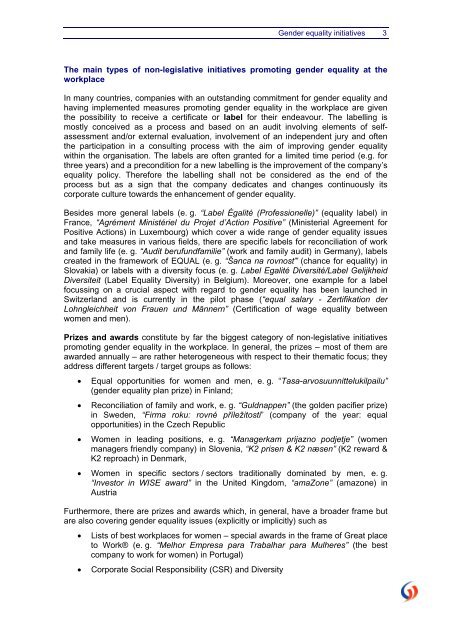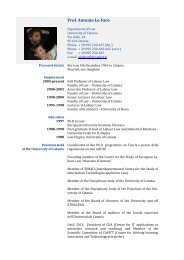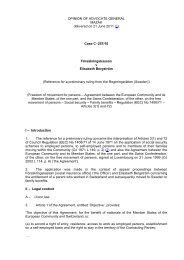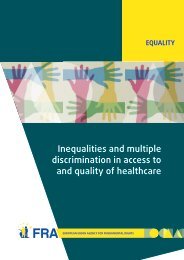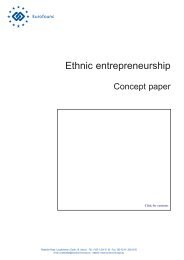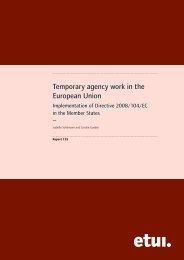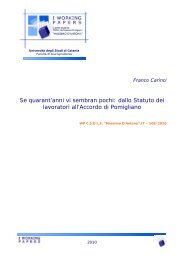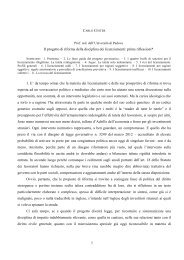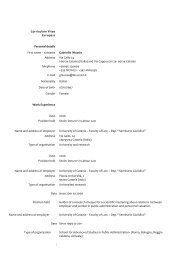Study on non-legislative initiatives for companies to promote gender ...
Study on non-legislative initiatives for companies to promote gender ...
Study on non-legislative initiatives for companies to promote gender ...
You also want an ePaper? Increase the reach of your titles
YUMPU automatically turns print PDFs into web optimized ePapers that Google loves.
Gender equality <strong>initiatives</strong> 3<br />
The main types of n<strong>on</strong>-<strong>legislative</strong> <strong>initiatives</strong> promoting <strong>gender</strong> equality at the<br />
workplace<br />
In many countries, <strong>companies</strong> with an outstanding commitment <strong>for</strong> <strong>gender</strong> equality and<br />
having implemented measures promoting <strong>gender</strong> equality in the workplace are given<br />
the possibility <strong>to</strong> receive a certificate or label <strong>for</strong> their endeavour. The labelling is<br />
mostly c<strong>on</strong>ceived as a process and based <strong>on</strong> an audit involving elements of selfassessment<br />
and/or external evaluati<strong>on</strong>, involvement of an independent jury and often<br />
the participati<strong>on</strong> in a c<strong>on</strong>sulting process with the aim of improving <strong>gender</strong> equality<br />
within the organisati<strong>on</strong>. The labels are often granted <strong>for</strong> a limited time period (e.g. <strong>for</strong><br />
three years) and a prec<strong>on</strong>diti<strong>on</strong> <strong>for</strong> a new labelling is the improvement of the company’s<br />
equality policy. There<strong>for</strong>e the labelling shall not be c<strong>on</strong>sidered as the end of the<br />
process but as a sign that the company dedicates and changes c<strong>on</strong>tinuously its<br />
corporate culture <strong>to</strong>wards the enhancement of <strong>gender</strong> equality.<br />
Besides more general labels (e. g. “Label Égalité (Professi<strong>on</strong>elle)” (equality label) in<br />
France, “Agrément Ministériel du Projet d’Acti<strong>on</strong> Positive” (Ministerial Agreement <strong>for</strong><br />
Positive Acti<strong>on</strong>s) in Luxembourg) which cover a wide range of <strong>gender</strong> equality issues<br />
and take measures in various fields, there are specific labels <strong>for</strong> rec<strong>on</strong>ciliati<strong>on</strong> of work<br />
and family life (e. g. “Audit berufundfamilie” (work and family audit) in Germany), labels<br />
created in the framework of EQUAL (e. g. “Šanca na rovnosť” (chance <strong>for</strong> equality) in<br />
Slovakia) or labels with a diversity focus (e. g. Label Egalité Diversité/Label Gelijkheid<br />
Diversiteit (Label Equality Diversity) in Belgium). Moreover, <strong>on</strong>e example <strong>for</strong> a label<br />
focussing <strong>on</strong> a crucial aspect with regard <strong>to</strong> <strong>gender</strong> equality has been launched in<br />
Switzerland and is currently in the pilot phase (“equal salary - Zertifikati<strong>on</strong> der<br />
Lohngleichheit v<strong>on</strong> Frauen und Männern” (Certificati<strong>on</strong> of wage equality between<br />
women and men).<br />
Prizes and awards c<strong>on</strong>stitute by far the biggest category of n<strong>on</strong>-<strong>legislative</strong> <strong>initiatives</strong><br />
promoting <strong>gender</strong> equality in the workplace. In general, the prizes – most of them are<br />
awarded annually – are rather heterogeneous with respect <strong>to</strong> their thematic focus; they<br />
address different targets / target groups as follows:<br />
• Equal opportunities <strong>for</strong> women and men, e. g. “Tasa-arvosuunnittelukilpailu”<br />
(<strong>gender</strong> equality plan prize) in Finland;<br />
• Rec<strong>on</strong>ciliati<strong>on</strong> of family and work, e. g. “Guldnappen” (the golden pacifier prize)<br />
in Sweden, “Firma roku: rovné příleži<strong>to</strong>sti” (company of the year: equal<br />
opportunities) in the Czech Republic<br />
• Women in leading positi<strong>on</strong>s, e. g. “Managerkam prijazno podjetje” (women<br />
managers friendly company) in Slovenia, “K2 prisen & K2 næsen” (K2 reward &<br />
K2 reproach) in Denmark,<br />
• Women in specific sec<strong>to</strong>rs / sec<strong>to</strong>rs traditi<strong>on</strong>ally dominated by men, e. g.<br />
“Inves<strong>to</strong>r in WISE award” in the United Kingdom, “amaZ<strong>on</strong>e” (amaz<strong>on</strong>e) in<br />
Austria<br />
Furthermore, there are prizes and awards which, in general, have a broader frame but<br />
are also covering <strong>gender</strong> equality issues (explicitly or implicitly) such as<br />
• Lists of best workplaces <strong>for</strong> women – special awards in the frame of Great place<br />
<strong>to</strong> Work® (e. g. “Melhor Empresa para Trabalhar para Mulheres” (the best<br />
company <strong>to</strong> work <strong>for</strong> women) in Portugal)<br />
• Corporate Social Resp<strong>on</strong>sibility (CSR) and Diversity


